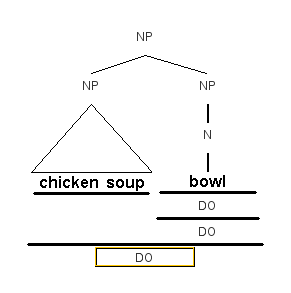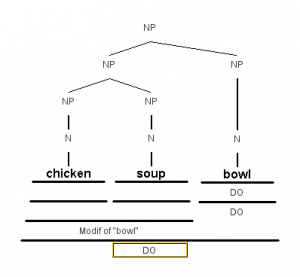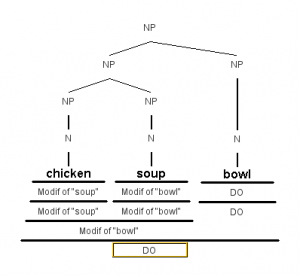Heyo pwips! Since there seemed to be some confusion about this in class, here’s some more instruction on nouns that modify nouns.
We know that adjectives and prepositional phrases can modify nouns-but so can other nouns. Take, for example, the phrase “chicken soup bowl.” The entire phrase is clearly an NP, with the head noun being “bowl.” But what about “chicken soup?”
To break it down further, we know that “chicken soup” is a noun phrase on its own. This means that there must be at least two NPs branching off the original NP node, like in the figure below.
Because it is a part of the original NP, we know that the function of “chicken soup” must be “Modif of ‘bowl.'”
However, we still have an NP made up of 2 nouns, which we can break down further. Because there are two distinct nouns in the phrase, each noun must get another NP node, as shown in the figure below.
Now that all of the forms are sorted, we just need to figure out the functions. One of the two nouns in “chicken soup” must be the head noun. Because the function of that NP is “Modif of ‘bowl,'” we know that the head noun’s function must also be to modify bowl.
The word “chicken” does not seem to modify bowl. “Chicken bowl” is not a common phrase. “Chicken,” however, can modify “soup.” “Chicken soup” is a phrase, as chicken describes the type of soup.
If chicken is not the head noun, that means it must be “soup.” This fits, as “soup bowl” is a common enough phrase. “Soup” describes what the bowl is used for. Its function must be “Modif of ‘bowl,'” as shown in the figure below.
Congrats! We successfully diagrammed nouns modifying nouns. You can do this with other constructions. Just remember to break the nouns down by phrases with each phrase getting a new NP node until you are left with one word phrases.


